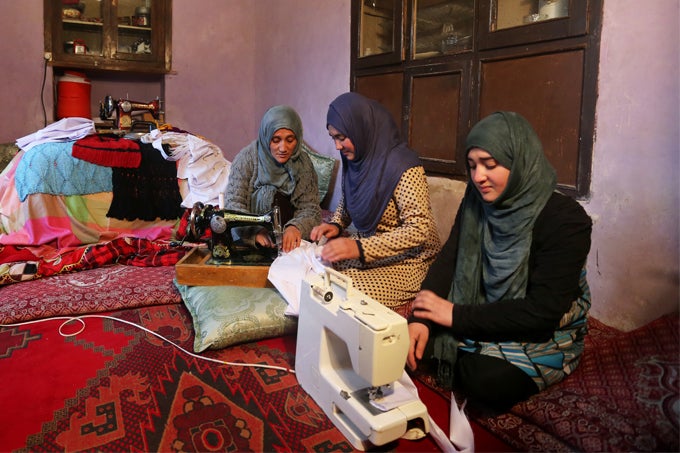 Empowering rural women to root out poverty in Afghanistan
Empowering rural women to root out poverty in Afghanistan
While out in the field, we have seen that women are badly affected by poverty in rural areas and the value of the services they provide at home are often overlooked.
Traditional norms have made it difficult for rural women to get a loan, start a business, and access financial information that can influence the way they earn, budget, and spend money.
Yet, women who are empowered and given the opportunity to develop economically have shown significant contributions to the growth and development of their community as well as the larger society. These women have established thriving business systems and reduce household poverty especially in rural areas.
Although urban centers, like Kabul, continue to grow and thrive in post-conflict Afghanistan, poverty is on the rise. Poverty in Afghanistan increased from 38.3 percent in 2012 to 54.5 percent in 2017, according to the Afghanistan Living Conditions Survey by the National Statistics and Information Authority.
This is due to rural areas struggling to compete in the modern market. As a national push for development, the Afghan government has taken steps to engage rural areas where growth is stagnant according to poverty statistics.
In response to the growing poverty of rural women, the Government of Afghanistan launched the Women’s Economic Empowerment – Rural Development Project (WEE-RDP) in October 2018. Operated under the Ministry of Rural Rehabilitation and Development (MRRD), the project is a national program that empowers rural women by helping them to mobilize into self-help groups (SHGs), open small businesses, and access financial services.
Before rolling out any project in the rural areas, we asked ourselves what areas we needed to invest in that can help alleviate poverty. Increasing women’s participation in the local economy and linking women producers with regional and national markets are lined up as key potential targets for WEE-RDP to achieve. With support from the project, rural women will create savings and credit groups that will help them start and expand their businesses and enter new markets.
The project will operate nationwide in 5,000 villages in 76 districts throughout Afghanistan.
Since its inception, WEE-RDP has started to work in over 25 provinces and received a warm welcome from local government entities, people's representatives, women, and the media. With 1,500 SHGs already established across the country, the project is building women's capacity in financial and business management, bookkeeping, and enterprise development.

Create opportunities for business development
In the southwest region, for example, WEE-RDP plans to work with 731 villages in eight districts of Helmand, Kandahar, Nimroz, Uruzgan, and Zabul provinces. It will help set up a Village Savings and Loan Association (VSLA) that will federate SHGs in each of the villages. A total of 548 million afghanis has been allocated as seed capital to the VSLAs, benefiting more than 58,500 rural people in the southwest region alone .
WEE-RDP will first begin work in Dand and Daman districts of Kandahar province. Haji Abdullah and Shadi Khan, district governors of Dand and Daman, respectively, have pledged their full support for the project. A large portion of the rural poor in these districts, they said, constitute women who are the sole breadwinners of their families and they can benefit from opportunities WEE-RDP creates.
As a first step, WEE-RDP will sign a Memorandum of Understanding with two commercial banks to open bank accounts for around 5,000 rural women in the southwest region, which would allow them to join SHGs, that can federate into a VSLA and receive the seed capital from the program.
A woman who applies for a bank account needs to produce a national identification card (Tazkira), but as most rural women don’t have identity documents, the WEE-RDP plans to facilitate and support the women application for the Id cards. We hope to see a surge in national identity applications in the region, which would help women register their businesses and seek loans.
Strong Afghanistan requires empowering women and providing them with equal opportunities for growth.
We learned from the Afghanistan Rural Enterprise Development Program (AREDP), the program that preceded WEE-RDP, that rural women represented a target group who were interested in business development, but were often ignored when it came to mobilizing resources for them.
WEE-RDP will build on AREDP's work and reach the most vulnerable women as we believe that building a strong Afghanistan requires empowering women and providing them with equal opportunities for growth.
WEE-RDP is funded by the Afghanistan Reconstruction Trust Fund (ARTF), managed by the World Bank on behalf of 34 donors, and International Development Association (IDA), the World Bank Group’s fund for the poorest countries.

Join the Conversation